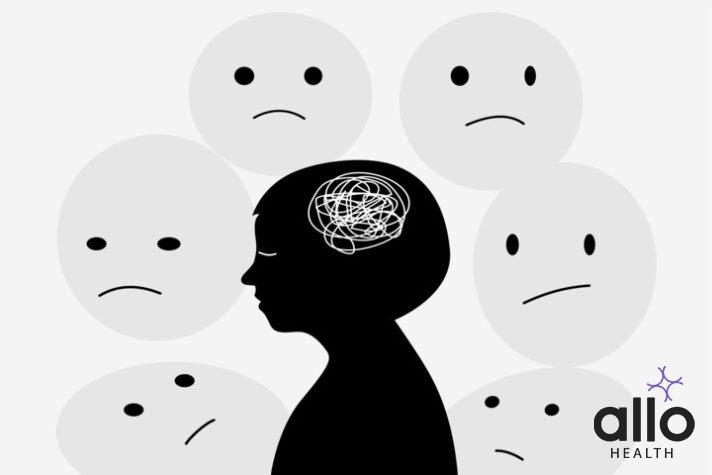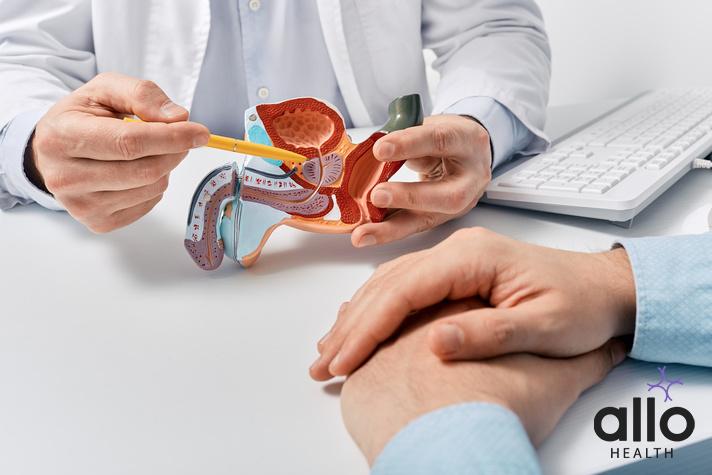Can Stress and Anxiety Cause Erectile Dysfunction?

"The following blog article provides general information and insights on various topics. However, it is important to note that the information presented is not intended as professional advice in any specific field or area. The content of this blog is for general educational and informational purposes only.
Book consultation
The content should not be interpreted as endorsement, recommendation, or guarantee of any product, service, or information mentioned. Readers are solely responsible for the decisions and actions they take based on the information provided in this blog. It is essential to exercise individual judgment, critical thinking, and personal responsibility when applying or implementing any information or suggestions discussed in the blog."
Erectile dysfunction (ED) is a medical condition that affects a significant number of men worldwide. It refers to the inability to achieve or maintain an erection sufficient for sexual intercourse. Many factors can contribute to ED, including physical conditions, medications, and psychological factors. Among the psychological factors that can cause ED, stress and anxiety are commonly cited as culprits.
Understanding Erectile Dysfunction
- Erectile dysfunction is a medical condition that occurs when the blood flow to the penis is insufficient to create or maintain an erection.
- The most common causes of ED are physical conditions that affect the blood vessels, nerves, and muscles that are involved in the process of achieving an erection. Some common physical causes of ED include diabetes, high blood pressure, heart disease, obesity, and multiple sclerosis.
- Medications, such as antidepressants, blood pressure medications, and antihistamines, can also cause ED.
- Psychological factors, such as stress and anxiety, can also contribute to ED. Stress and anxiety can affect the brain’s ability to signal the blood vessels and nerves that control the process of achieving an erection.
- Psychological factors can also lead to a decrease in libido, which can make it difficult to get or maintain an erection.
Stress Levels and Anxiety Levels: A Common Culprit
- Stress and anxiety are common experiences for most people, and they can have both positive and negative effects.
- Short-term stress can be helpful in increasing focus and motivation, while chronic stress can have adverse effects on physical and mental health.
- Anxiety is a feeling of worry, nervousness, or unease about something with an uncertain outcome. While anxiety can be a normal response to stress, it can also become chronic and debilitating.
- Stress and anxiety can affect every aspect of a person’s life, including sexual health. When a person is stressed or anxious, their body produces a hormone called cortisol.
- Cortisol is also known as the “stress hormone,” and it can have adverse effects on sexual health.
- High levels of cortisol can lead to a decrease in libido, which can make it difficult to achieve or maintain an erection.
- In addition to cortisol, stress and anxiety can affect other hormones that play a role in sexual health. For example, stress and anxiety can cause a decrease in testosterone levels. Testosterone is a hormone that is important for sexual health, and low levels of testosterone can contribute to erectile dysfunction.

Can Stress and Anxiety Cause Erectile Dysfunction?
Stress and anxiety can indeed contribute to erectile dysfunction (ED) through various physiological and psychological mechanisms.
Physiological Response to Stress and Anxiety:
- When you experience stress or anxiety, your body undergoes a “fight or flight” response. This triggers the release of stress hormones like adrenaline and cortisol.
- These hormones lead to physiological changes in the body, including increased heart rate, elevated blood pressure, and tightened blood vessels.
Impact on Blood Flow:
- In terms of sexual function, these physiological responses can affect blood flow, a critical component of achieving and maintaining an erection.
- Increased heart rate and blood pressure can lead to vasoconstriction, which narrows blood vessels. This constriction reduces blood flow to the penis, making it more challenging to achieve an erection.
Interference with Nitric Oxide Production:
- Nitric oxide is a key chemical involved in the process of achieving an erection. It helps relax the smooth muscle cells in the blood vessels of the penis, allowing them to dilate and increase blood flow.
- Stress and anxiety can disrupt the production and release of nitric oxide, making it more difficult to achieve and sustain an erection.
Psychological Factors:
- Beyond the physical effects, stress and anxiety can have a significant impact on a person’s mental state and emotional well-being.
- Performance anxiety, fear of intimacy, or concerns about sexual performance can create a self-perpetuating cycle. These worries can lead to heightened stress and anxiety, further exacerbating the issue.
Hormonal Imbalance:
Chronic stress can disrupt the delicate balance of hormones in the body. Elevated levels of cortisol, the primary stress hormone, can interfere with the production of testosterone, which plays a crucial role in sexual function.
Relationship Strain:
Persistent stress and anxiety can strain relationships. This can create additional emotional and psychological pressure, making it even more challenging to engage in sexual activity comfortably.
Reduced Libido and Desire:
High levels of stress and anxiety can lead to a decrease in libido, making individuals less interested in or motivated for sexual activity.
Long-Term Effects:
If stress and anxiety persist over an extended period, it can lead to chronic ED. This is because long-term exposure to stress can lead to more significant physiological changes in the body, potentially causing more persistent erectile difficulties.
It’s crucial to remember that everyone’s response to stress and anxiety is different. While some individuals may experience temporary difficulties with erections due to stress, others may not. Seeking support from a healthcare professional, therapist, or counsellor can be helpful in managing stress and anxiety and addressing any associated sexual health concerns.
Research Studies
Several research studies have been conducted to investigate the relationship between stress, anxiety, and ED.
- A study published in the Journal of Sexual Medicine found that men with high levels of anxiety and depression were more likely to experience ED than men without these conditions. The study also found that men who reported higher levels of stress had a greater risk of ED.
- Another study published in the International Journal of Impotence Research found that stress was a significant predictor of ED in men. The study also found that anxiety was a significant predictor of ED in men who had a history of sexual dysfunction.
- A study published in the Journal of Sex Research found that stress and anxiety can affect sexual function in both men and women. The study found that stress and anxiety were associated with decreased sexual desire, sexual arousal, and orgasm in both men and women.
While these studies suggest a link between stress, anxiety, and ED, it is important to note that correlation does not imply causation. In other words, just because stress and anxiety are associated with ED does not necessarily mean that they cause ED.

Other Factors to Consider
- While stress and anxiety can contribute to ED, it is essential to consider other factors that may also play a role.
- For example, smoking, excessive alcohol consumption, and a sedentary lifestyle can all contribute to ED.
- Medications, such as blood pressure medications, antidepressants, and antihistamines, can also cause ED.
- It is essential to speak with a healthcare provider to determine the underlying cause of ED and develop a treatment plan.
Body, Mind & Sex
Both physical and mental health are important for healthy and satisfying sex because they are interconnected and affect each other in various ways.
Physical Health
- Physical health plays a crucial role in sexual health. Conditions such as obesity, heart disease, and diabetes can all contribute to erectile dysfunction (ED) and other sexual dysfunctions.
- Poor physical health can also lead to decreased libido, reduced sexual desire, and decreased sexual satisfaction.
- Maintaining good physical health can improve sexual health and function. Regular exercise can increase blood flow, boost hormone levels, and improve cardiovascular health, all of which can contribute to better sexual health.
- A healthy diet that is rich in fruits, vegetables, lean protein, and whole grains can also improve overall health and sexual function.
Mental Health
- Mental health also plays a critical role in sexual health. Conditions such as anxiety, depression, and stress can all contribute to sexual dysfunction.
- For example, anxiety can lead to sexual performance anxiety, which can make it difficult to achieve and maintain an erection.
- Depression can decrease libido and make it difficult to feel sexual desire or pleasure.
- On the other hand, good mental health can improve sexual function and satisfaction. Feeling happy, relaxed, and confident can improve sexual desire, performance, and overall satisfaction.
- Emotional intimacy, communication, and trust are all important components of a healthy sexual relationship and require good mental health.
The Connection Between Physical and Mental Health
Physical and mental health are closely connected and can influence each other. For example, poor physical health can lead to stress, anxiety, and depression, all of which can contribute to sexual dysfunction. Chronic stress can also lead to fatigue, which can make it difficult to feel motivated for sexual activity.
Conversely, good physical health can improve mental health. Exercise releases endorphins, which can improve mood and reduce stress and anxiety. Exercise can also improve self-confidence, which can improve sexual performance and satisfaction.
Improving Both Physical and Mental Health for Better Sexual Health
Improving both physical and mental health can lead to better sexual health and function. Here are some tips for improving both physical and mental health:
Physical Health
- Exercise regularly:Regular exercise can improve cardiovascular health, increase blood flow, and boost hormone levels, all of which can contribute to better sexual health.
- Eat a healthy diet:A diet that is rich in fruits, vegetables, lean protein, and whole grains can improve overall health and sexual function.
- Maintain a healthy weight: Being overweight or obese can contribute to sexual dysfunction and reduce sexual desire and satisfaction.
- Avoid smoking and excessive alcohol consumption:Both smoking and excessive alcohol consumption can contribute to sexual dysfunction and reduce sexual desire and satisfaction.
Mental Health
- Manage stress:Chronic stress can contribute to sexual dysfunction and reduce sexual desire and satisfaction. Practice stress-reducing techniques such as meditation, yoga, or deep breathing exercises.
- Seek treatment for mental health conditions:Conditions such as anxiety and depression can contribute to sexual dysfunction. Seek treatment from a mental health professional if you are struggling with these conditions.
- Communicate with your partner:Good communication is essential for a healthy sexual relationship. Talk openly and honestly with your partner about your sexual needs and desires.
- Practice emotional intimacy:Emotional intimacy, such as cuddling, hugging, and kissing, can improve mental health and strengthen the bond between partners.

Treatment Options
The treatment for ED depends on the underlying cause.
CBT:
- If stress and anxiety are contributing to ED, there are several treatment options that may be effective. For example, cognitive-behavioural therapy (CBT) can be effective in reducing stress and anxiety.
- CBT is a type of talk therapy that helps individuals identify and change negative thought patterns that contribute to stress and anxiety.
Erectile Dysfunction Medications:
- Sildenafil (Viagra): Increases blood flow to the penis, helping to achieve and maintain an erection.
- Tadalafil (Cialis): This drug provides a longer window of effectiveness compared to Viagra, allowing for more spontaneity.
Intraurethral Suppositories:
- Alprostadil (MUSE): A tiny pellet is inserted into the urethra using a disposable applicator, promoting blood flow to the penis.
Penile Injections:
- Alprostadil (Caverject, Edex): Administered via injection directly into the side of the penis, inducing an erection.
Vacuum Erection Devices (VEDs):
- A device that creates a vacuum around the penis, drawing blood into the area to facilitate an erection. It is often used in combination with a constriction ring to maintain the erection.
Penile Implants (Prosthesis):
- Surgically implanted devices that provide an on-demand erection. There are two main types: inflatable and semi-rigid.
Hormone Replacement Therapy:
- In cases where hormonal imbalances contribute to ED, hormone replacement therapy may be recommended.
Lifestyle Changes:
- Adopting a healthy lifestyle, including regular exercise, a balanced diet, maintaining a healthy weight, and avoiding smoking and excessive alcohol consumption, can improve erectile function.
Psychological Counselling:
- Therapy or counselling can be beneficial for addressing psychological factors contributing to ED, such as anxiety, depression, or relationship issues.
Pelvic Floor Exercises (Kegels):
- Strengthening the pelvic floor muscles can help improve erectile function, particularly in cases where weak pelvic muscles are a contributing factor.
Platelet-Rich Plasma (PRP) Therapy:
- Involves injecting a concentrated form of a patient’s own blood plasma into the penis to stimulate tissue regeneration and improve blood flow.
Managing Underlying Health Conditions:
- Addressing and managing underlying conditions like diabetes, high blood pressure, or cardiovascular disease can improve overall erectile function.
Key Takeaways
- Erectile dysfunction (ED) is the inability to achieve or maintain an erection for sexual intercourse, often caused by physical, psychological, or medication-related factors.
- Physical conditions like diabetes, high blood pressure, heart disease, and medications can contribute to ED.
- Stress and feelings of anxiety can disrupt the body’s physiological responses, affecting blood flow and nitric oxide production, leading to ED.
- Chronic stress and anxiety may result in decreased libido and relationship strain, exacerbating ED.
- Research shows a correlation between high levels of anxiety, depression, and ED, emphasizing the importance of addressing mental health.
- Both physical and mental health play crucial roles in sexual function, with lifestyle changes, therapy, and medical interventions being potential treatment options for ED.
- Integrating healthy habits, seeking professional help for mental health concerns, and exploring appropriate treatments can lead to improved sexual health and function.
Frequently Asked Questions
Q: Can stress and anxiety directly cause erectile dysfunction?
A: While stress and anxiety can contribute to erectile dysfunction (ED) through physiological responses that affect blood flow and hormonal balance, they are often just one aspect of a complex interplay of factors. It’s important to consider other potential causes and seek professional advice for proper diagnosis and treatment.
Q: What are the symptoms of erectile dysfunction?
A: The symptoms of erectile dysfunction (ED) include difficulty achieving or maintaining an erection, reduced sexual desire, and potential emotional distress or relationship strain.
Q: Can progressive muscle relaxation help with stress-induced ED?
A: Yes, progressive muscle relaxation, a stress-reduction technique, may help alleviate stress-induced ED by promoting relaxation and reducing anxiety, potentially improving erectile function. It’s advisable to consult a healthcare provider for medical advice on treatment options.
Q: Can sex therapy help with anxiety-related erectile dysfunction?
A: Yes, sex therapy can be beneficial for individuals experiencing anxiety-induced erectile dysfunction (ED). It focuses on addressing psychological factors, identifying source of stress and anxiety, providing coping strategies, and improving sexual confidence, ultimately helping to alleviate performance-related anxiety and improve sexual function. It’s recommended to consult a qualified sex therapist for personalised guidance.
Q: Can lifestyle changes alleviate stress-induced erectile dysfunction?
A: Yes, adopting a healthy lifestyle that includes regular exercise, balanced nutrition, stress-reducing practices, and avoiding smoking and excessive alcohol consumption can positively impact erectile function. However, it’s important to consult a healthcare provider for comprehensive guidance and to address any underlying medical conditions contributing to erectile dysfunction.







































